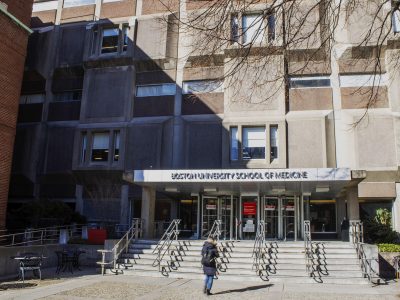
The National Institute of Neurological Disorders awarded Boston University associate professor of neurology Michael Alosco a two-year $460,000 grant to study the chronic traumatic encephalopathy brain disease.
Alosco will work alongside Gil Rabinovici, a neurology professor at the University of California San Francisco, to examine 30 former NFL players and 10 controls in their study.
The study titled “Focused Imaging for the Neurodegenerative Disease Chronic Traumatic Encephalopathy,” or FIND-CTE, will take place at BU and UCSF.
Alosco and Rabinovici chose former NFL players as their participants, because CTE is commonly linked to the sport’s physical trauma.
“This is a progressive brain disease that’s been associated with repeated hits to the head, such as those from American football,” Alosco said.
Alosco said CTE is not detectable when patients are alive due to a lack of biomarkers — an indicator of a disease — and is only diagnosable after death through a brain exam.
“There’s really an urgent need to identify a test in life that can detect this disease,” Alosco said, “so we can really start to study it, and then hopefully move to treatment and prevention.”
The study will involve a new neuro-imaging technique, which Alosco said would hopefully detect the tau protein that accumulates in a brain as a result of CTE.
The FIND-CTE is a proof-of-concept study, meaning the study will test its hypothesis on whether or not its protein tracer, MK 6240, can detect tau proteins and CTE in living brains and subjects.
“If the initial data are promising,” Alosco said, “it really gives you a direction of a technique to pursue that can ultimately detect this neurodegenerative disease that we cannot detect in life at this time.”
If the study is successful, he added, it could be life-changing for those with brain damage and groundbreaking in the field of neurology.
“It will move us that much closer to be able to [diagnose] this disease in life,” Alosco said, “and move us that much closer to developing treatment and prevention trials.”
Participants in the study will be recruited through the Concussion Legacy Foundation in both Boston and San Francisco, Alosco said.
Once recruited, he added, participants will undergo an evaluation through the Alzheimer’s disease research centers at each university, which will include thinking and memory tests, neurology exams, MRIs, blood tests and PET scans.
UCSF has already received Institutional Review Board approval and can start recruiting participants, Alosco said, while BU will reach IRB approval soon and hopes to start scanning in February or March.
College of Arts and Sciences freshman Raghu Nema, a neuroscience major, said the study could have a large impact even outside of football if successful.
“CTE is a pretty big problem of course in the football field,” Nema said, “but it can also be applied to other fields like other sports … where there’s a lot of head trauma.”
He added the study and the concepts involved could potentially be extended to Alzheimer’s and other diseases in the future.
“I think it’s pretty ambitious,” Nema said, “but I think it will be very fruitful if possible.”




















































































































